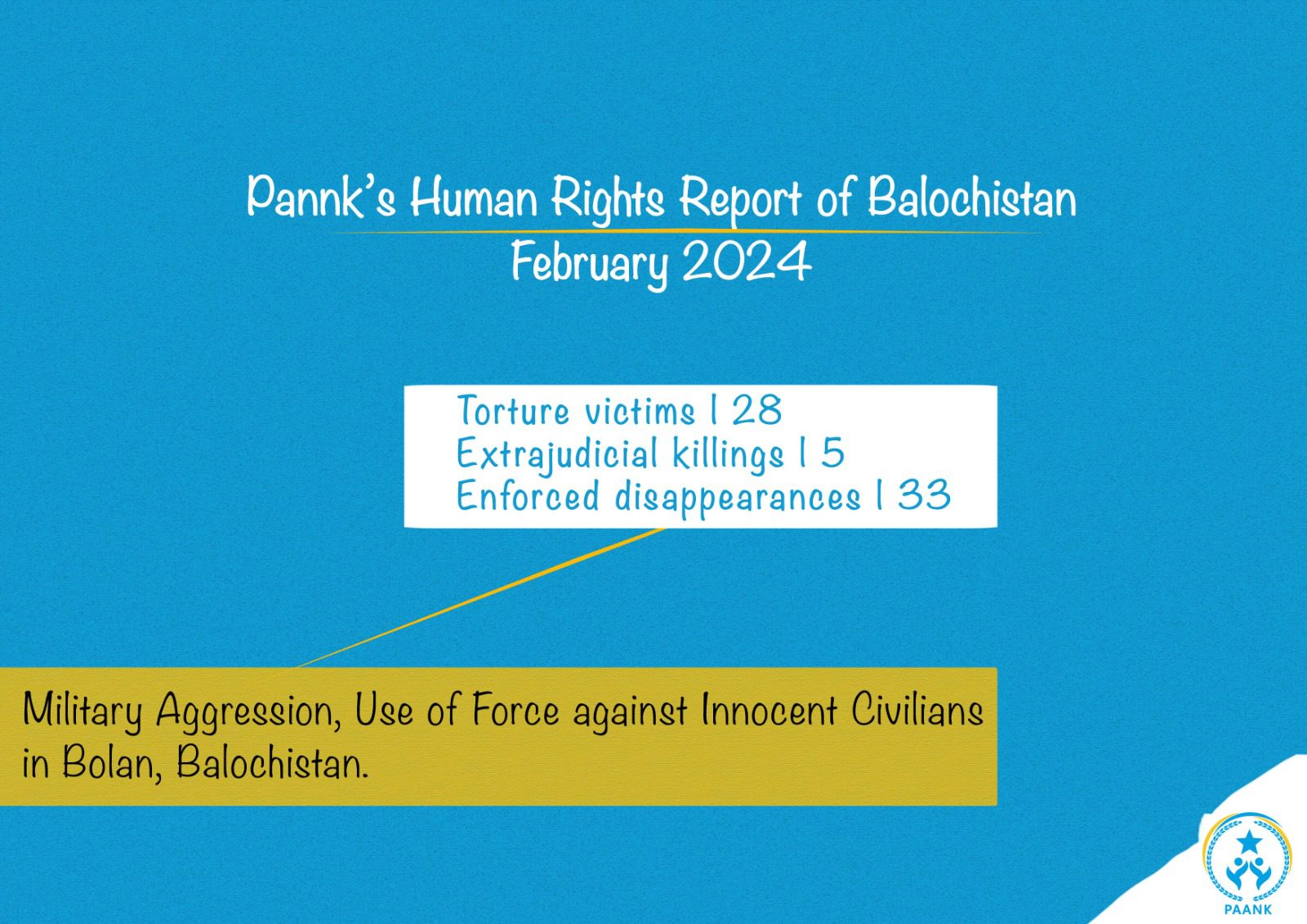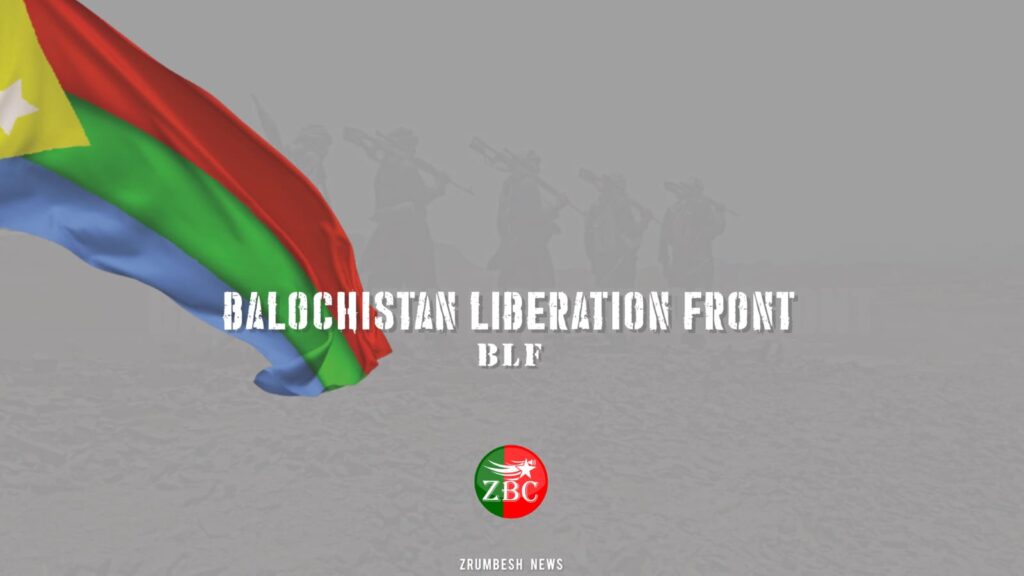The Human Rights Department of the Baloch National Movement (BNM) has released a comprehensive report on the human rights situation in Balochistan for February 2024. The document exposes incidents across Balochistan, shedding light on the concerning trend of enforced disappearances in the region during the preceding month.
A detailed list with data has been made public.According to the report, February 2024 witnessed 33 cases of enforced disappearances documented in various areas of Balochistan. Notably, 28 individuals who had been forcibly disappeared were subsequently released from torture cells. Additionally, following the conflict between the Pakistan Army and Baloch Sarmachars in Mach, 5 individuals were labeled as attackers and subsequently killed. Significantly, these victims had previously been forcibly disappeared while in the custody of the Pakistan army.
The alarming rise in cases of enforced disappearances and extrajudicial killings continues to be a grave concern in Balochistan.
— Paank (@paank_bnm) March 5, 2024
During the month of February 33 cases of forced disappearances were reported from different areas of #Balochistanhttps://t.co/03bkgDpTux
In addition to these findings, the report addresses protests by relatives of forcibly disappeared individuals in Kech and Gwadar. It also delves into the killing of detainees by the Pakistan army post the conflict between Baloch Sarmachars and the Pakistani army in Mach. The use of force against innocent civilians during the Pakistani military offensive in Bolan is documented, expressing deep concern over these critical events and providing detailed accounts.
Regarding the enforced disappearance of youths in Kech and Gwadar and the subsequent protests by their families, the Paank report emphasizes the urgent need for in-depth research to comprehend the profound damage inflicted upon the consciousness and social development of Baloch society. Baloch youth, full of life and hope, are forcibly taken from educational institutions and streets upon arrest and confined to torture cells for extended periods. Even upon release, many are left mentally paralyzed, with their thoughts monitored by the Pakistani army and its clandestine agencies. Individuals are coerced into forced exile, transformed into living corpses, or compelled to assist the Pakistan army against their people, becoming indifferent members of their society.Panak’s report underscored that the protest concluded with the police assuring that the majority of forcibly disappeared youths, who were illegally detained, would be falsely implicated in cases to justify their arrest and detention. Unfortunately, family members, feeling helpless, often acquiesce to illegal demands in which individuals are taken from their homes and falsely implicated in cases.
Paank characterizes it as a human rights violation that is currently being overlooked, emphasizing the need for human rights organizations to focus on these issues and provide legal assistance to those imprisoned in Balochistan jails who were previously forcibly disappeared by the Pakistani army.
The report details the demise of five detainees at the hands of the Pakistan army in Mach, with evidence of the enforced disappearance of all these individuals. Relatives of some were present at the Islamabad sit-in against enforced disappearances. Among the identified bodies, Bashir Ahmad Marri, son of Haji Khan, and Arman Marri, son of Nihal Khan Marri, were forcibly disappeared on July 2, 2023. Sobdar, son of Gulzar Khan, was forcibly disappeared from Harnai Bazaar on September 9, 2023. The relatives of these individuals took part in the Islamabad sit-in, urging their recovery. The fourth body was identified as Shakeel Ahmed, son of Muhammad Ramzan, resident of Zehri, who, according to his family, was forcibly disappeared on June 4, 2023.
The report emphasizes that the killing of detainees linked to the Mach incident reflects the continuation of the Pakistani army’s brutal actions, asserting that concepts like mercy and human rights hold no meaning for them. The cycle of violence, according to Paank, will persist until influential entities and international intervention put a halt to it.
The Paank report strongly denounces Pakistani military aggressions in Bolan, stating that the Pakistan Army is currently engaged in extensive actions against Baloch Sarmachars across a wide area. These actions disproportionately impact the civilian population rather than specifically targeting Baloch Sarmachars.
According to Paank, despite its claim to professionalism, the Pakistan Army consistently violates the rules of war and human rights in this ongoing aggression. Paank calls for an urgent investigation into the actions of the Pakistani army at the international level. Just as protection for the general population is mandated during wars, parties involved are obligated to uphold human rights. The people of Balochistan are entitled to the same rights as any other human beings in conflict zones. The international community should press the Pakistani government to grant access to international organizations and media for a comprehensive review of the actions of the Pakistani army in these areas.
The report highlights that Baloch Sarmachars engage in guerilla warfare, with hideouts located away from cities and populations. Despite this, the Pakistani army consistently encircles civilian populations during military actions, leading to repeated complaints of human rights violations. The silence on these matters is detrimental to the dignity of humanity.



